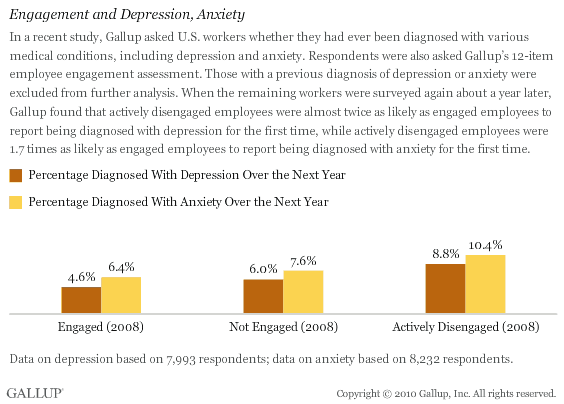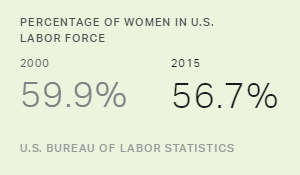Gallup has studied employee engagement for decades. Researchers have interviewed millions of people in numerous job roles in hundreds of companies all over the world. Over and over, Gallup has found that engagement -- an emotional and psychological bond between workers and workplaces -- leads to better work performance.
But recently, Gallup discovered that better employee engagement means better health too. "Engaged people feel less stress, and the stress they do feel is offset by a lot more happiness and enjoyment and interest," says James K. Harter, Ph.D., Gallup's chief scientist of workplace management and well-being and coauthor of 12: The Elements of Great Managing.
Not only do anxiety and depression take a personal toll on workers, but they also result in significant direct costs to businesses.
The converse is true of the disengaged, who feel more stress and have fewer sources of pleasure at work. "There's a significant relationship between work, stress, and health," Harter says. "In other words, if people are in an ongoing work situation that is negative or stressful, they have a higher potential for negative health consequences."
Disengagement and mental health
Those health consequences have been associated with a variety of illnesses in people over the age of 45 -- and not just ailments of age. The quality of the workplace can be linked to serious physical and mental illnesses such as clinical depression and chronic anxiety that can have a significant negative impact on workers' job performance and on their personal lives.
Anxiety and depression can be serious conditions that undermine daily functioning and health. According to the National Institute of Mental Health (NIMH), anxiety, typically a normal reaction to stress, becomes debilitating when it becomes "an excessive, irrational dread of everyday situations." In a given year, approximately 40 million U.S. adults (18 and older) -- about 18% of the U.S. population -- are affected by an anxiety disorder.
Depression, according to NIMH, interferes with daily life and normal functioning. While the symptoms of depression vary depending on the individual and his or her illness, they include "persistent sad, anxious or 'empty' feelings; feelings of hopelessness and/or pessimism; . . . loss of interest in activities or hobbies once pleasurable; . . . fatigue and decreased energy; [and] difficulty concentrating, remembering details and making decisions." About 14.8 million American adults, or about 7% of the U.S. population aged 18 and older, are affected by depression in a given year.
Not only do anxiety and depression take a personal toll on workers, but they also result in significant direct costs to businesses in medical expenses -- and indirect costs, including lost productivity. In 2000, for example, the economic burden of depression in the United States was estimated at $83.1 billion, which included $26.1 billion in direct treatment costs and $51.5 billion in indirect workplace costs from absenteeism and "presenteeism," or reduced productivity while at work due to depression. And a 2003 study found that workers with depression reported an average of 5.6 hours of lost productive time at work each week, compared with an expected 1.5 hours of lost productive time among workers without depression.
A recent Gallup study into the effects of disengagement on mental health -- conducted February 2008 through April 2009 -- studied U.S. workers as the country moved through the recession. At the start of the study, which involved 9,561 employed adults, Gallup asked respondents whether they had ever been diagnosed by a healthcare professional as suffering from a variety of medical conditions, including depression and anxiety. Respondents with a previous diagnosis of depression or anxiety were excluded from the analysis. Respondents were also asked Gallup's 12-item employee engagement assessment, the Q12, which determines an individual's level of engagement with his or her workplace.
When these respondents were surveyed again about eight months later, Gallup found that 6.4% of engaged workers had been diagnosed with anxiety, compared with 7.6% of not-engaged workers and 10.4% of actively disengaged workers. And 4.6% of engaged workers had been diagnosed with depression, as had 6% of not-engaged workers and 8.8% of actively disengaged workers. In other words, actively disengaged employees were 1.7 times as likely as engaged employees to report being diagnosed with anxiety for the first time in the next year. And actively disengaged employees were almost twice as likely as engaged employees to report being diagnosed with depression for the first time in the next year. (See graphic "Engagement and Depression, Anxiety.")

The connection between the quality of a workplace and employee engagement is well-established. What's more, engagement has proved to be a powerful predictor of many key organizational outcomes, including profitability, productivity, customer engagement, quality, safety, and retention. This research shows that there is a strong connection between engagement and important individual outcomes, such as employees' mental health.
References
Greenberg, P.E., Kessler, R.C., Birnbaum, H.G., Leong, S.A., Lowe, S.W., Berglund, P.A., et al. (2003). The economic burden of depression in the United States: How did it change between 1990 and 2000? The Journal of Clinical Psychiatry, 64(12), 1465-1475.
Stewart, W.F., Ricci, J.A., Chee, E., Hahn, S.R., Morganstein, D. (2003). Cost of lost productive work time among US workers with depression. The Journal of the American Medical Association, 289(23), 3135-3144.
